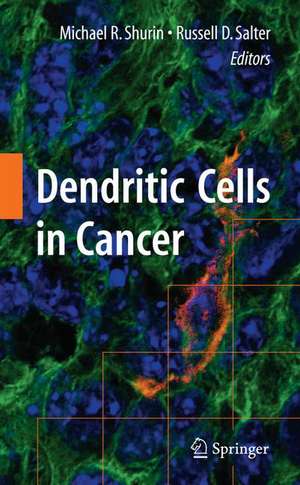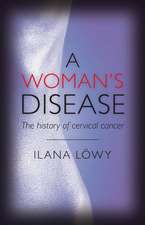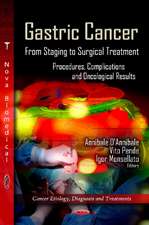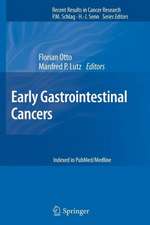Dendritic Cells in Cancer
Editat de Michael R Shurin, Russell D. Salteren Limba Engleză Hardback – 13 apr 2009
Specific topics to be covered include analysis of DC behavior in the tumor microenvironment, including endogenous and exogenous DC, multiple DC populations, molecular pathways responsible for DC dysfunction, tumor-derived factors altering DC polarization and activation, mechanisms of DC alterations, and the role of DC in tumor escape from immune recognition and elimination. Furthermore, additional chapters provide extensive analysis of the consequences of cancer therapy on the DC system and how aging impacts DC function in the tumor microenvironment. Finally, chapters are included examining strengths and pitfalls of current methodologies for generating DC from cancer patients for therapeutic purposes and on the role of tumor-mediated modulation of the DC system in cancer immunotherapy.
| Toate formatele și edițiile | Preț | Express |
|---|---|---|
| Paperback (1) | 1100.85 lei 6-8 săpt. | |
| Springer – 28 oct 2010 | 1100.85 lei 6-8 săpt. | |
| Hardback (1) | 1107.94 lei 6-8 săpt. | |
| Springer – 13 apr 2009 | 1107.94 lei 6-8 săpt. |
Preț: 1107.94 lei
Preț vechi: 1166.26 lei
-5% Nou
Puncte Express: 1662
Preț estimativ în valută:
212.01€ • 221.91$ • 176.45£
212.01€ • 221.91$ • 176.45£
Carte tipărită la comandă
Livrare economică 31 martie-14 aprilie
Preluare comenzi: 021 569.72.76
Specificații
ISBN-13: 9780387886107
ISBN-10: 0387886109
Pagini: 396
Ilustrații: XVIII, 396 p. 26 illus.
Dimensiuni: 155 x 235 x 24 mm
Greutate: 0.76 kg
Ediția:2009
Editura: Springer
Colecția Springer
Locul publicării:New York, NY, United States
ISBN-10: 0387886109
Pagini: 396
Ilustrații: XVIII, 396 p. 26 illus.
Dimensiuni: 155 x 235 x 24 mm
Greutate: 0.76 kg
Ediția:2009
Editura: Springer
Colecția Springer
Locul publicării:New York, NY, United States
Public țintă
Professional/practitionerDescriere
It covers all aspects of DC generation, function, survival and antitumor activity in the tumor environment both in vivo and in experimental in vitro systems. The goal in focusing on a spectrum of issues related to DC in cancer is to provide an extensive and expansive review rather than a collection of independent analyses from different authors.
Specific topics to be covered include analysis of DC behavior in the tumor microenvironment, including endogenous and exogenous DC, multiple DC populations, molecular pathways responsible for DC dysfunction, tumor-derived factors altering DC polarization and activation, mechanisms of DC alterations, and the role of DC in tumor escape from immune recognition and elimination. Furthermore, additional chapters provide extensive analysis of the consequences of cancer therapy on the DC system and how aging impacts DC function in the tumor microenvironment. Finally, chapters are included examining strengths and pitfalls of current methodologies for generating DC from cancer patients for therapeutic purposes and on the role of tumor-mediated modulation of the DC system in cancer immunotherapy.
Specific topics to be covered include analysis of DC behavior in the tumor microenvironment, including endogenous and exogenous DC, multiple DC populations, molecular pathways responsible for DC dysfunction, tumor-derived factors altering DC polarization and activation, mechanisms of DC alterations, and the role of DC in tumor escape from immune recognition and elimination. Furthermore, additional chapters provide extensive analysis of the consequences of cancer therapy on the DC system and how aging impacts DC function in the tumor microenvironment. Finally, chapters are included examining strengths and pitfalls of current methodologies for generating DC from cancer patients for therapeutic purposes and on the role of tumor-mediated modulation of the DC system in cancer immunotherapy.
Cuprins
PREFACE 1 Introduction: The Dendritic Cell System 2 Alterations of the Dendritic Cell System in Cancer 2.1 Introduction to the mechanisms of DC abnormalities in cancer 2.2 Elimination of functional DC in cancer by inhibiting dendropoiesis, accelerating DC fate and induction of DC apoptosis 2.3 Inhibition of DC function in cancer 2.4 Polarization of DC subsets (DC1/DC2/DCreg) in the tumor environment 2.5 Avoidance as a mechanism of DC-mediated tumor escape 3 Mechanisms of Dendritic Cell Dysfunction in Cancer 3.1 Introduction to the mechanisms of DC dysfunction in cancer 3.2 Factors and substances responsible for DC modulation in cancer 3.2.1 Tumor-derived factors responsible for DC malfunction Tumor stromal immunomodulators with DC targeting activities Tumor exosomes as DC modulators 3.3 Signaling pathways mediating DC dysfunction in cancer 3.3.1 Overview of intracellular signaling in DC in the tumor environment 3.3.2 A role for STAT3 in DC regulation by tumor-derived factors Other (PKC, PKA, small Rho GTPases) Tumor-associated inflammation and DC modulation Cancer therapy and DC immunomodulation Cancer, aging and the DC system 4 Role of the Dendritic Cell System in Tumor Escape 4.1 Introduction to the role of DC in Tumor Escape 4.2 Regulatory DC: Friends or Enemies? 4.3 Role of IDO in DC development and function in cancer 4.4 Angiogenic DC and their role in tumor regulation 4.5 DC Maturation versus Polarization in tumor escape: Where do we stand? 4.6 DC/DC interaction and development of antitumor immunity 5 Role of tumor-mediated modulation of the DC system in cancer immunotherapy 6 How to generate DC from cancer patients for therapeutic purposes? 7 Future direction in DC research in cancer Concluding Remarks
Textul de pe ultima copertă
Significant features of cancer are suppression and redirection of the immune response, which allow for tumor development and growth in the previously immune competent host. Central to development of immune responses are dendritic cells, and unsurprisingly these cells are strongly impacted by tumors and factors derived from them, as well as by other conditions associated with tumor progression or cancer treatments. Further, as some of the frontline strategies for treatment of cancer involve immunotherapy with ex vivo cultured or in vivo modulated dendritic cells, it becomes imperative to understand how dendritic cells interact with and are affected by the tumor microenvironment. "Dendritic Cells in Cancer," edited by Michael R. Shurin and Russell D. Salter, presents thorough analyses of the complex biology of the tumor-dendritic cell relationship, and offers insights into how cancer treatments may benefit from furthering our understanding in this area.
Caracteristici
Presents the very first analysis of published and not-yet published experimental and clinical data related to the immunobiology of DC in tumor-bearing hosts
No other publication combines all issues related to immunobiology of DC in cancer in one rationally organized comprehensive volume prepared by the leading experts in the field
Includes supplementary material: sn.pub/extras
No other publication combines all issues related to immunobiology of DC in cancer in one rationally organized comprehensive volume prepared by the leading experts in the field
Includes supplementary material: sn.pub/extras













